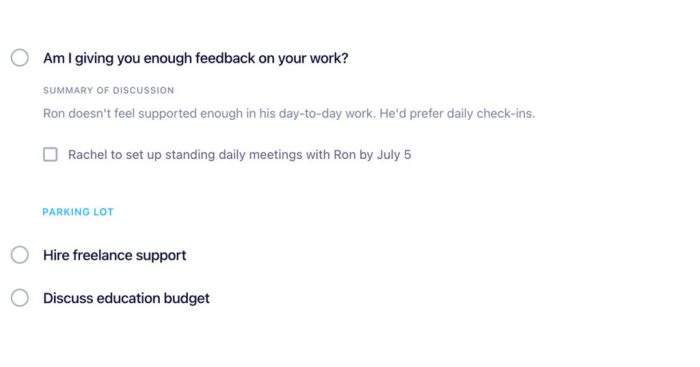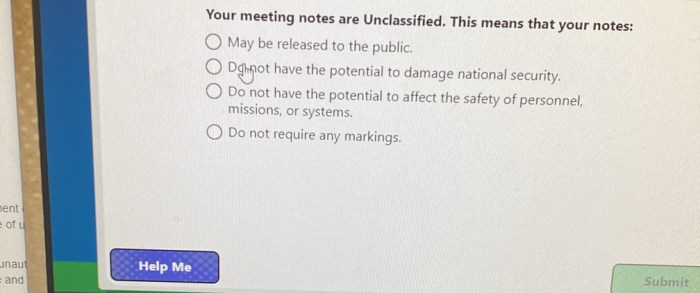Your meeting notes are unclassified. This means that your notes, along with the sensitive information they may contain, are not subject to the same level of protection as classified information. As a result, it is important to be aware of the potential risks and vulnerabilities associated with unclassified meeting notes and to take steps to protect them from unauthorized access.
This article will provide an overview of the security implications and compliance considerations associated with unclassified meeting notes. It will also discuss best practices for handling unclassified meeting notes and the potential impact of unclassified meeting notes on business operations.
Finally, it will provide suggestions for training and awareness programs for employees who handle unclassified meeting notes.
Security Implications of Unclassified Meeting Notes

Unclassified meeting notes pose potential security risks and vulnerabilities. Sensitive information, such as strategic plans, financial data, and confidential discussions, could be compromised if the notes fall into the wrong hands. Unauthorized access to unclassified meeting notes can lead to data breaches, reputation damage, and even legal liability.
Examples of Sensitive Information
- Company secrets
- Financial projections
- Customer information
- Employee performance reviews
- Intellectual property
Importance of Maintaining Confidentiality, Your meeting notes are unclassified. this means that your notes
Maintaining confidentiality of unclassified meeting notes is crucial to protect the interests of the organization and its stakeholders. Unauthorized access can compromise sensitive information, leading to financial losses, reputational damage, and legal consequences.
Compliance Considerations: Your Meeting Notes Are Unclassified. This Means That Your Notes
Organizations must comply with relevant laws and regulations governing the handling of unclassified meeting notes. The Gramm-Leach-Bliley Act (GLBA) and the Health Insurance Portability and Accountability Act (HIPAA) are examples of regulations that impose strict requirements for protecting sensitive information.
Potential Consequences of Non-Compliance
- Fines and penalties
- Reputational damage
- Loss of customer trust
- Legal liability
Steps for Compliance
- Establish clear policies and procedures for handling unclassified meeting notes
- Train employees on security best practices
- Implement access controls and encryption measures
- Regularly review and update security protocols
Best Practices for Handling Unclassified Meeting Notes

Organizations should implement best practices to securely store and transmit unclassified meeting notes. Encryption, access controls, and other security measures should be employed to prevent unauthorized access and data breaches.
Encryption
Encrypting meeting notes ensures that the information is protected even if it falls into the wrong hands. Encryption algorithms, such as AES-256, can be used to render the notes unreadable without the proper decryption key.
Access Controls
Access controls limit who can access unclassified meeting notes. Role-based access control (RBAC) systems can be used to grant different levels of access based on job responsibilities and need-to-know principles.
Limiting Distribution
Organizations should limit the distribution of unclassified meeting notes to only those who need to know the information. This reduces the risk of unauthorized access and potential data breaches.
Impact on Business Operations

Unclassified meeting notes can have a significant impact on business operations. They can affect decision-making, collaboration, and communication within the organization.
Decision-Making
Unclassified meeting notes provide valuable information for decision-making. However, if the notes are not handled securely, the information they contain could be compromised, leading to poor decisions and negative consequences for the organization.
Collaboration
Unclassified meeting notes facilitate collaboration by providing a shared record of discussions and decisions. However, if the notes are not handled securely, the information they contain could be leaked, damaging relationships with partners and stakeholders.
Communication
Unclassified meeting notes serve as a communication tool, allowing individuals to share information and updates. However, if the notes are not handled securely, the information they contain could be intercepted, leading to misunderstandings and reputational damage.
Training and Awareness

Training and awareness programs are essential for ensuring that employees understand the importance of handling unclassified meeting notes securely. Training should cover best practices, security protocols, and the consequences of non-compliance.
Effective Training Materials
- Interactive workshops
- Online training modules
- Case studies and simulations
Ongoing Awareness Campaigns
Ongoing awareness campaigns reinforce best practices and keep security top-of-mind for employees. These campaigns can include regular email reminders, posters, and presentations.
Key Questions Answered
What are the potential risks and vulnerabilities associated with unclassified meeting notes?
Unclassified meeting notes may contain sensitive information that could be compromised if they are not properly protected. This information could include financial data, trade secrets, or other confidential information. Unauthorized access to unclassified meeting notes could also lead to reputational damage or legal liability.
What are the best practices for handling unclassified meeting notes?
There are a number of best practices that organizations can follow to help protect unclassified meeting notes from unauthorized access. These practices include using encryption, access controls, and other security measures. Organizations should also limit the distribution of sensitive information and provide training for employees who handle unclassified meeting notes.